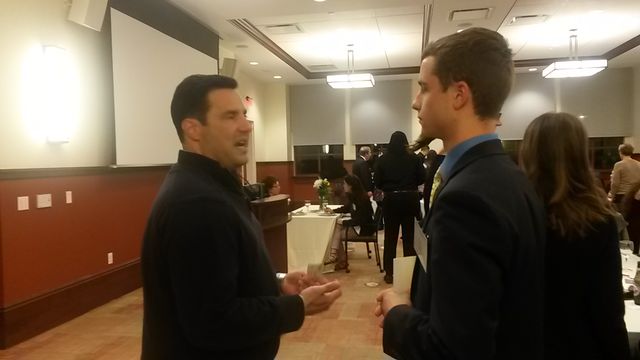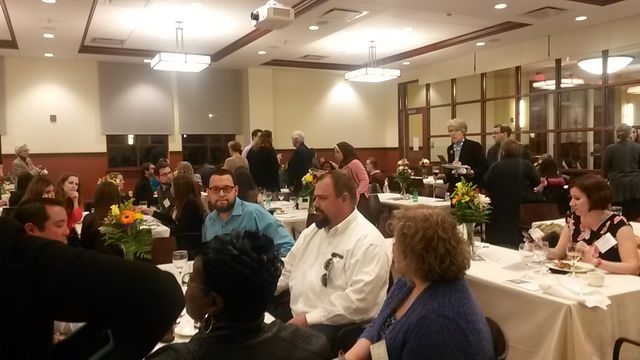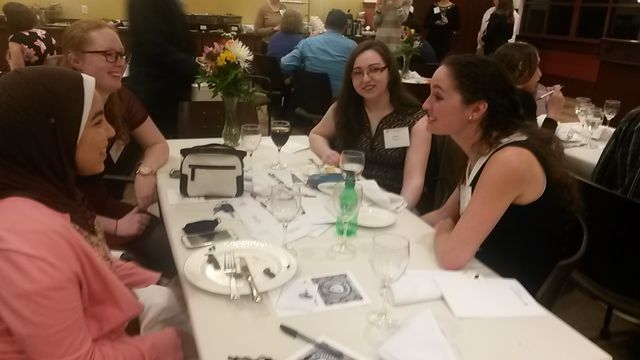
Alumnus Sal Anderton, Esq., ’95, speaking with Ryan Gallagher, a current Honors Program student.
Photo Credit: Kristen Bryfogle
The Honors Program at Montclair State University celebrated its 30th anniversary last week, inviting alumni and current students to share with one another how the program impacted their undergraduate careers through its academically-rigorous liberal arts education.
Honors Program graduates from the very first to the most recent class flocked to the Feliciano School of Business for dinner, drinks and festivities on Tuesday, March 15 to celebrate the program’s milestone.
Graduates in attendance included lawyers, teachers, consumer researchers and artists among others, all of whom made their start at the Honors Program.
In 1985, members of the Montclair State community, including the program’s current director Dr. Gregory Waters, took it upon themselves to design a program for students who performed exceptionally well in high school. Admittance to the program was based on each applicant’s class rank, SAT score, writing skills, advanced course selections and performance and/or outstanding extracurricular involvement.

Attendants of the Honors Program 30th Anniversary Celebration connect in the Feliciano School of Business.
Photo Credit: Kristen Bryfogle
From these efforts, the Honors Program was born, offering students who gained admittance to the program an alternate path to completing many of their general education requirements through smaller seminars taught by some of the best professors Montclair State had to offer.
The very first Honors Program classes planned were the Great Books classes, alternative courses to the standard Writing 105 and 106. Great Books I and II focus on reading and writing about classic books. These courses are still required for freshmen in the Honors Program.
Since its inception, the Honors Program has seen several changes. Its offices were relocated to the first floor of College Hall after its original site, Russ Hall, was renovated into a residence hall.
The program has also seen curriculum changes and five directors since its inception. Many of the classes were initially team-taught, Waters said, but this practice only remains in the Honors Seminar in Science due to the limited schedules of professors who teach honors courses.
After Assistant Vice President for Annual Giving and Alumni Engagement Jeanne Marano welcomed attendants to the Tuesday night reception, Waters, alumnus Sal Anderton, Esq. and Program Assistant Chrystel Williams all thanked those who returned to the university in support of the program and touched on the benefits of an education through the Honors Program.
Attendants then had the opportunity to reconnect with classmates and professors, speaking of their achievements since graduation and their most cherished memories of the program.
Kyle Stuber, who works in higher education at Rhode Island School of Design, and Lynn Chao, who currently attends Columbia University’s Teachers College for music education, were able to reconnect on Tuesday. Both were in the Honors Program, and Stuber was Chao’s Resident Assistant during their time at Montclair State.

Current Students Kim Gallagher and Salma Hassan (left) chat with recent graduates Amber Kusching and Rebecca Lamb (right).
Photo Credit: Kristen Bryfogle
Chao said that the level of academic rigor required of students in the Honors Program aided her in her current educational endeavor at Columbia.
Stuber, on the other hand, appreciated the diversity of the program’s classes, which offered a variety of topics and an alternative structure to many other classes at Montclair State. “There was a lot of talking happening among students, rather than being talked at by the professor. That was something I really valued,” he said.
Stuber went on to praise the program in general, saying, “In high school, you don’t really know what you’re getting yourself into by joining the program, but it really was substantial.”
Besides the academic benefits, however, many students feel connections with classmates and professors in the program, forming professional and personal relationships that last. Recent graduate Rebecca Lamb credits the program with introducing her to her best friend. “It was like a tight-knit family,” she said.
Anderton, who graduated in 1995, agreed, stressing that one of the best parts of the Honors Program was feeling that he was part of a community, since he had classes with and lived among other students in the program during his transition to college.
Anderton also remembered his special connection to Williams, whose first day as Program Assistant was his first day of school as a freshman. Williams received a standing ovation from attendants earlier in the night when Waters thanked her for her “key leadership in all of our lives.”
In the future, Waters would like to see the program expand through increased scholarships and opportunities to study abroad, though he admits that this has been difficulty because a lack of state funding.
Now, however, is a time for the program to celebrate its achievements. “Over the 30 years,” Waters said, “we have had very little attrition. Our students generally graduate in four years, often with Latin honors. They are, in addition to being leaders on campus, among the strongest students in their major. That’s a very important achievement.”


